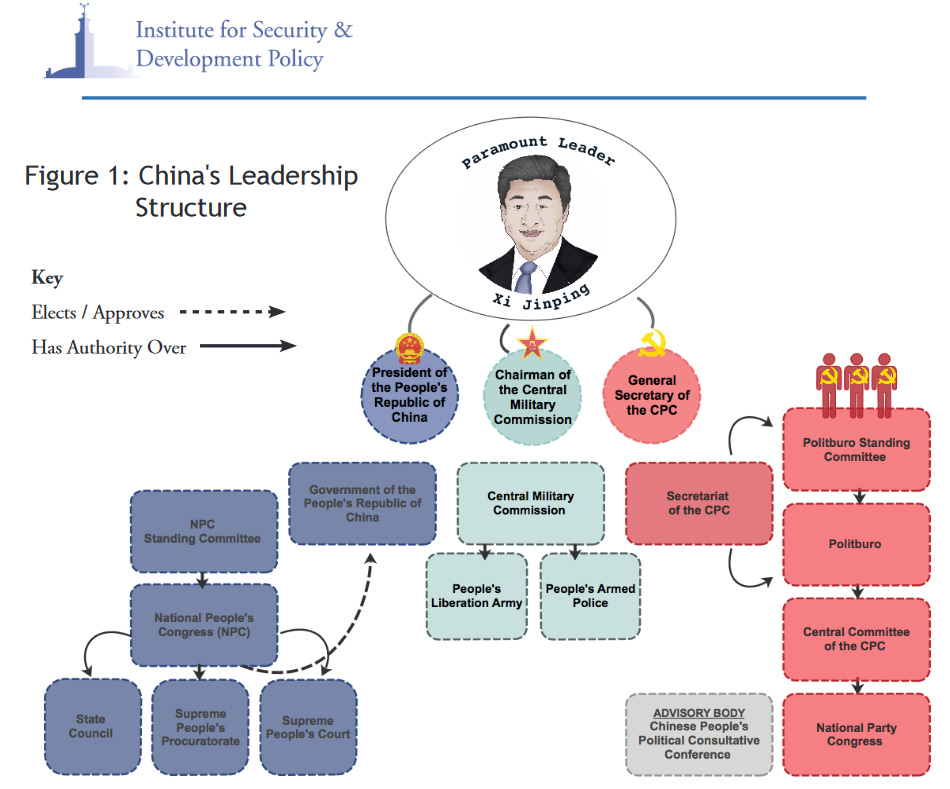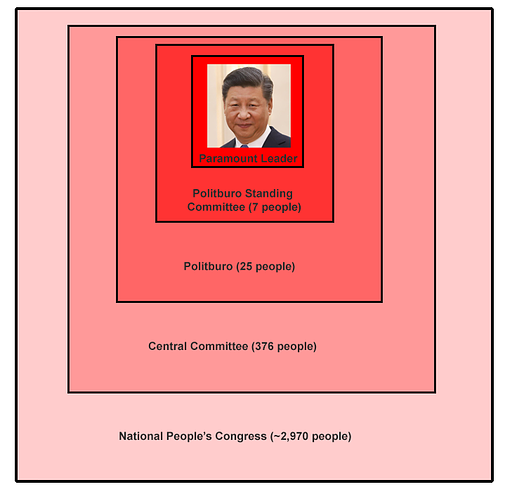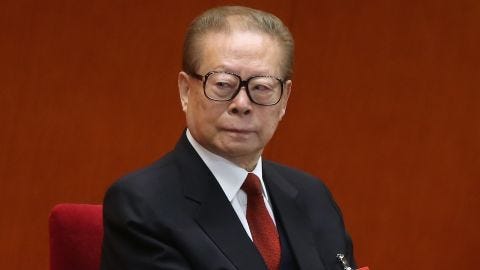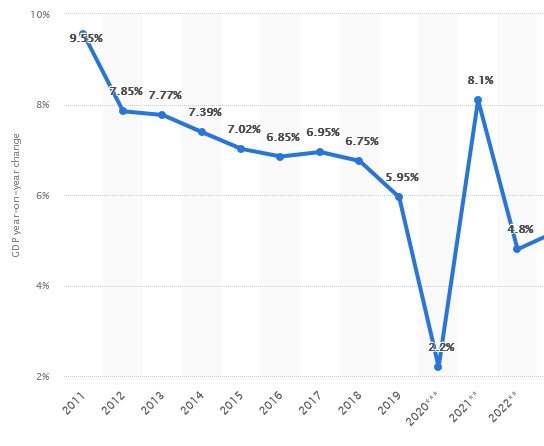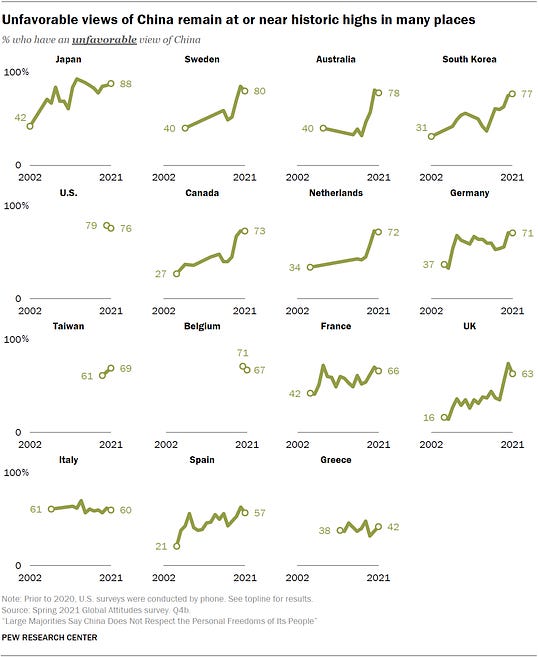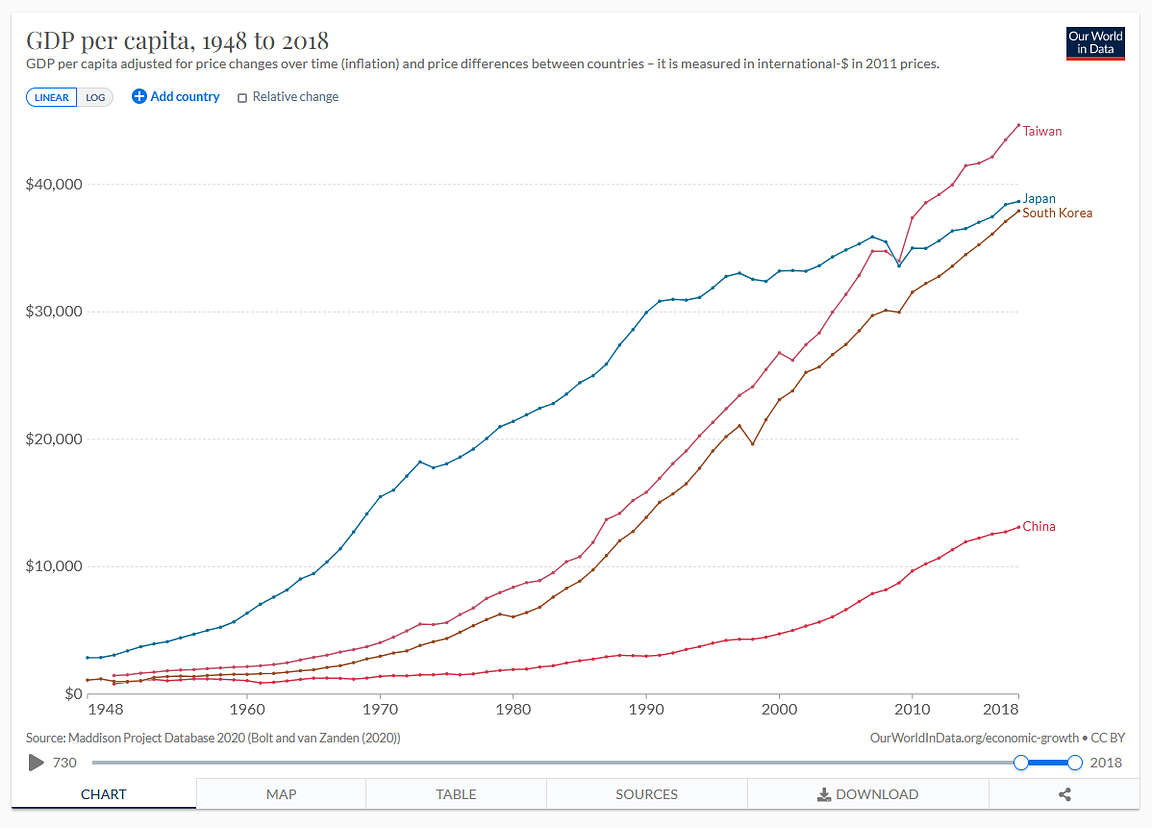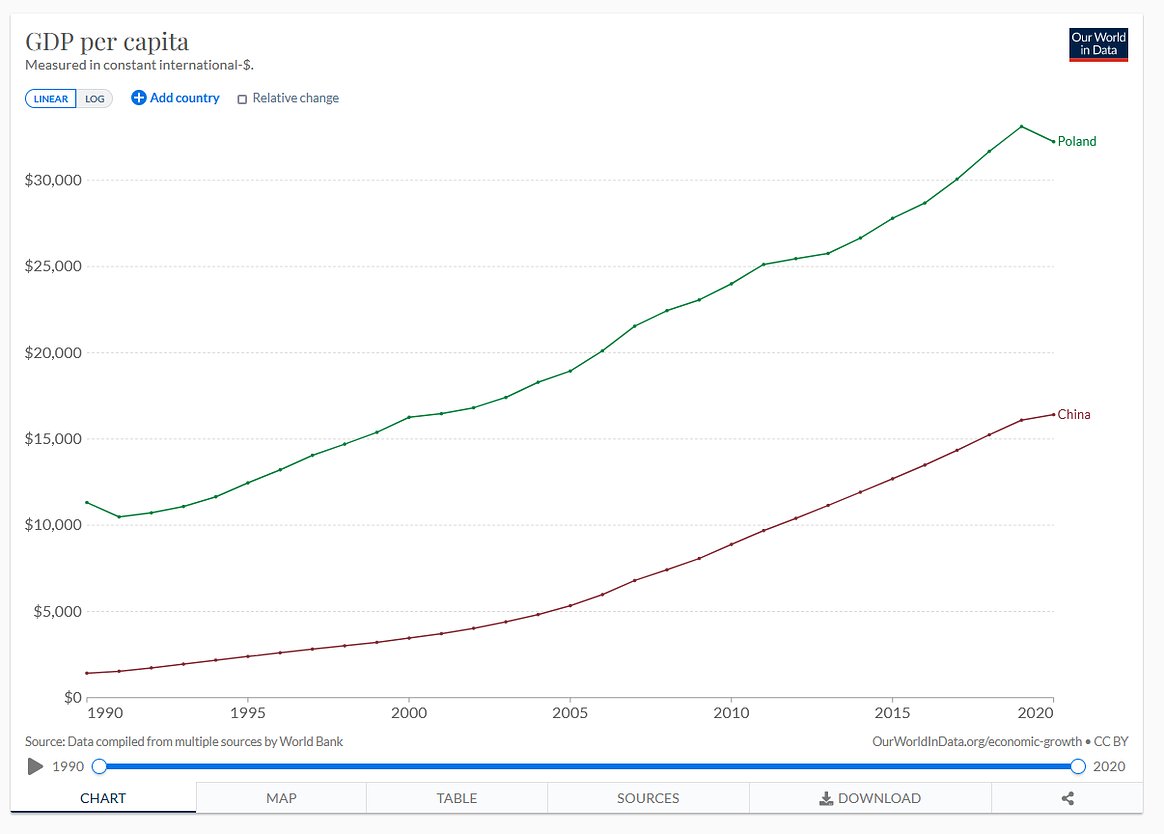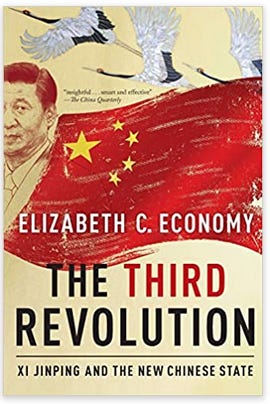Astral Codex Ten - Dictator Book Club: Xi Jinping
The Third Revolution, by Elizabeth Economy, promises to explain “the transformative changes underway in China today”. But like her namesake, Dr. Economy doesn’t always allocate resources the way I would like. I came to the book with questions like: How did the pre-Xi Chinese government work? How was it different from dictatorship? What safeguards did it have against it? Why hadn’t previous Chinese leaders become dictators? And: How did Xi come to power? How did he defeat those safeguards? Had previous Chinese leaders wanted more power? How come they failed to get it, but Xi succeeded? Third Revolution barely touched on any of this. It mostly explained Xi’s domestic and foreign policies. Some of this was relevant: a lot of Xi’s policies involve repression to prop up his rule. But none of it answered my key questions. So this is less of a book review than other Dictator Book Club entries. It’s a look through recent Chinese history, with The Third Revolution as a very loose inspiration. How Does China’s Government Work?The traditional answer is a flowchart like this one (source): But you could give a similarly convoluted flowchart for America, and it would tell people much less than words like “democracy” or “balance of powers”. What’s the Chinese equivalent? I found it a little more helpful to see it diagrammed it as a series of nested squares: The inner levels have real power, and the outer layers are theoretically overseers but actually rubber stamps. Things get more and more rubber-stampy as you go out, culminating in the National People’s Congress, which recently voted to re-elect Xi by a vote of 2,970 in favor, 0 against - it’s so irrelevant that it’s literally called “the NPC”. Who chooses the members of the inner groups? In theory, the outer groups; for example, the Central Committee is supposed to elect the Politburo Standing Committee. In practice, these selections tend to be of the “2,970 in favor, 0 against” variety, so they must be taking marching orders from someone. Who? The Chinese government doesn’t talk about it much, but probably the members of the Politburo Standing Committee hand-pick everyone, including the Paramount Leader and their own successors. How do they pick? Mostly patron-client relationships. Every leading politician cultivates a network of loyal supporters; if he takes power, he tries to put as many of his people into top posts as he can. The seven Politburo members wheel and deal with each other about whose clients should get which positions, including any unoccupied Politburo seats. If the two word description of US politics is “democracy, checks-and-balances”, then the two word description of Chinese politics is “oligarchy, patrons-and-clients”. If this seems exotic, it shouldn’t: it’s not much different from how the US fills unelected posts like “ambassador” and “White House staffer”. The Trump presidency put this into especially sharp relief, either because Trump did it more blatantly than usual or just because Trump’s clients were so obviously different from the normal Washington crowd. Consider eg the appointment of Jeff Sessions (among the first Congressmen to endorse Trump) as Attorney General. In the US, this is a peripheral part of the system, checked by democracy. In China, it’s the whole game. Was China’s Government A “Technocracy?”For a while, all (or almost all) of China’s top officials had engineering degrees. When Xi Jinping first joined the Politburo Standing Committee in 2008, eight of its nine members were engineers. Paramount Leader Hu Jintao was a hydroelectric engineer. His second-in-command Wen Jiabao was a geological engineer. There were two electrical engineers, a petroleum engineer, a radio engineer, and two chemical engineers (including Xi himself). The only non-engineer was Li Keqiang, an economist. And this was actually a low point in engineers’ dominance of Chinese power. The term before, 100% of Politburo Standing Committee officials had been engineers! What’s going on? For one thing, Deng Xiaoping thought engineers were cool, and he was powerful enough to do whatever he wanted. A government made up entirely of engineers? Sure, whatever you say. And since the top echelons of Chinese government appoint their own successors, these engineers could appoint other engineers and so on. But also: during the Cultural Revolution, about half of Chinese people who got degrees at all got engineering degrees. The Cultural Revolutionaries were really not big on education (according to one article, “Xi's secondary education [was cut short] when all secondary classes were halted for students to criticise and fight their teachers.") But engineering was useful for building factories, and so was grudgingly tolerated. That meant that of the people smart and ambitious enough to get into college at all, half did engineering. The other half? I’m not sure. Law is a popular major for would-be politicians in the US, but here’s a Chinese person explaining why it doesn’t work that way in China (short version: China doesn’t have great rule of law, so lawyers don’t matter much and are low status). Here is an article telling us not to take China’s engineer-kings too seriously. It argues that (aside from Deng’s original picks), most of them never did much engineering, and just studied the subject in school as a generic prestigious-sounding degree to springboard their government career. Chinese engineering curricula are easy, and powerful people frequently cheat or pay others to write their dissertations. Aside from a few of Deng’s personal picks, we should think of this less as “China is a magic place where rational scientists hold power”, and more as “for idiosyncratic reasons, social climbers in China got engineering degrees.” Certainly none of these people were selected for the Politburo on the basis of their engineering acumen. They got their power by bribing, flattering, and backstabbing people, just like everyone else. In any case, Xi’s old Politburo class was the last one to be made primarily of engineers. The current Politburo has only one engineer - Xi himself. How Autocratic Was Pre-Xi China?This varied a lot. Mao Zedong was definitely an autocrat. After his death, everyone backstabbed each other furiously for several years and Deng Xiaoping ended up on top. Deng had absolute power but thought that was bad, so he created lots of institutions that were supposed to prevent future leaders from exercising the control he had, then sort of backed down. He appointed former Shanghai mayor Jiang Zemin as his successor. Jiang followed Deng’s anti-absolute-power rules, but he was able to get most of what he wanted anyway. Partly this was because he was a really skilled politician, partly it was because he had a really good secret police force with personal loyalty to him and lots of blackmail on everyone else.
When Jiang took power, he filled important positions with his clients. Mostly these were his underlings from Shanghai; they became known as the Shanghai Gang. The Shanghai Gang stuck together and supported its own, and operated kind of as a “political party” “representing” the interests of east coast urban business elites. (“Jiang And His Shanghai Gang” sounds like a good name for kids’ TV show, or maybe a hip-hop group.) The inland rural commoners felt threatened and loosely united under the leadership of officials from the Communist Youth League. The Shanghai Gang and the CYL made some kind of power-sharing agreement behind closed doors, probably involving a pledge to alternate who got the Paramount Leader position, so that it would be CYL’s turn next. Deng had mandated a ten-year term limit for Paramount Leaders, and Jiang dutifully resigned in 2003 and let CYL choose the next Paramount Leader. They picked Hu Jintao, former Youth League secretary. Hu was not quite as adept a politician as Jiang, and the remaining Shanghai Gangers frequently outmanuevered him. He served for ten years, then dutifully turned over power to the Shanghai favorite, Xi Jinping. This isn’t a great answer to the question “how autocratic was pre-Xi China”? In particular, I don’t get exactly what prevented Jiang or Hu from seizing power, overstaying their term limits, or killing their enemies (I assume it was some mix of not being sure the military would back them and not wanting to destabilize the country, but I don’t feel like I have a gears-level understanding). I also don’t get what it meant for some Chinese leaders to be better at pursuing their policy agenda than others: what levers did they pull? How did they quash dissent? But at the very least, it was non-autocratic enough that there were two factions, and sometimes the out-of-power faction could act as a check on the ruler. How Did Xi Become Paramount Leader?Hu Jintao retired when his term ran out, it was the Shanghai Gang’s turn to pick a new leader, and they picked Xi. Why? It all happened behind closed doors, but we can guess at their reasoning. Xi was a loyal Shanghaier. He was the client of Zeng Qihong, himself a client of Jiang Zemin, and had been party secretary in Shanghai. His loyalty to the faction was unimpeachable. But he was a Shanghaier who could appeal to the CYL. As a teenager during the Cultural Revolution, he was deported to the interior province of Shaanxi to work as a farmer and ditch-digger. His years of hard labor in Chinese flyover country made him more palatable to the hicks of the CYL than the average East Coast elite would be. Xi’s father, Xi Zhongxun, was former Vice-President of China. That made Xi a “princeling”, ie a descendant of Communist “royalty”. China-watchers disagree on how organized the princelings are and whether they count as a “faction”. But they’re at least kind of a faction, and it didn’t hurt that he represented them too. Finally, a few months before the “election”, powerful Politburo member Bo Xilai was arrested on sensational corruption charges. In a country where almost every high official was corrupt, Bo had gone above and beyond: while trying to cover his misdeeds, he’d killed a British national and threatened his own client, the chief of police. The chief fled to an American consulate and might have tried to defect to the US. We still don’t know the whole story, but the whole Chinese leadership got enraged and sentenced Bo to life in prison. Bo had made powerful enemies, and those enemies happened to control the censors that year. They chose not to censor the Bo story - even though it was embarrassing to the government - because they wanted to destroy Bo and his faction using public humiliation. Ordinary Chinese people had long suspected everyone was corrupt, but now they had front-row seats as the leadership confirmed it was true for at least this one guy. The public trial and investigation had its intended effect: Bo Xilai and his faction were torn apart, their region of politics-space salted so thoroughly that nothing would ever grow there again. But it left the leadership nervous: the public was spooked about corruption. They needed to credibly signal that they took the problem seriously. Xi Jinping was their guy. He’d made a focus of rooting out corruption in his previous posts, and had a reputation for being non-corrupt himself. He had already been a leading candidate to succeed Hu, but the Bo Xilai incident made him a shoo-in. How Did Xi Gain Dictatorial Levels Of Power?I can’t find good information on this, but here are three preliminary hypotheses. 1: Anti-Corruption?Xi launched the most extensive anti-corruption campaign in Chinese history, which caught many high-level officials. Dictators throughout the world have used anti-corruption campaigns to eliminate opponents (see eg Erdogan), and the timing is right, so this would be a really plausible theory. The guy who ran the anti-corruption effort, Wang Qishan, is a childhood friend of Xi’s (they were roommates together on the farm commune) and 100% one of his clients and loyalists. The only problem with this theory is that I can’t quite make it work. Most power in China lies with the Politburo Standing Committee. But Xi never investigated any PSC members for corruption (he did investigate an ex-member, but that doesn’t help him). Naively I would expect that seizing power would involve investigating and imprisoning his PSC rivals, until his supporters dominated the body. But as far as I can tell he didn’t do that. Maybe fear keeps them in line? You can read a stronger argument for this in Two Birds, One Policy: The Establishment Of The National Supervisory Commission As A Factional And Centralizing Tool, but it’s not going to answer my question. 2: Sheer Luck About Who Got Promoted When?This is from Choi 2021, From Power Balance To Dominant Faction In Xi Jinping’s China:
One thing that confuses me about this explanation is that Xi quickly pivoted from the champion of the Shanghai Gang to having his own faction, sometimes called the Xi Gang or the Tsinghua Gang. (a quick gripe: sometimes it feels like half the people in Chinese politics have gangs, the other half are surnamed Gang, and it takes a lot of mental overhead to figure out which is which. Consider eg this headline: China Official Yang Gang Investigated For Corruption. How long did it take you to parse that this was a single person?) Starting with your faction controlling a lot of power is good if you keep the faction. But Xi didn’t, so how did he benefit? Maybe the current “Xi Gang” and the old “Shanghai Gang” are the same people by a different name? But then how do we explain headlines like “Shanghai Gang” Seeks Xi’s Ouster? Maybe the term “Shanghai Gang” is now used for the remnants of the old Shanghai Gang who refused to switch allegiance to Xi? Or maybe Xi used his Shanghai support to get absolute power, and then once he got it he turned on his old supporters. 3: Tsinghua University Has a Really Good Alumni Relations Department?I realize this is a weird thing to attribute the rise of a dictator of the world’s largest country to, but this is sort of the conclusion of The Rise Of The Tsinghua Clique: Cultivation, Transfer, And Relationships In Chinese Elite Politics. Tsinghua and Peking Universities, both in Beijing, are the Harvard and Yale of China. In 2002, Tsinghua administrators were sad that their graduates didn’t get as many top posts in government as Peking grads did. They started a program where Tsinghua grads interned with, networked with, and supported other Tsinghua grads. It was a really good program. In a country where everything works on informal patron-client relationships anyway, it provided a helpful nucleus of “have you considered making your patron-client relationships based around going to the same university?” Also, Tsinghua paid its grads to take lower-paid (but more prestigious) government positions. Anywhere else, a new grad might have to choose between a high-paid job in private industry, or a very-low-paid (but prestigious and high room-for-advancement) job as a mid-level official in an outlying province, and might have gone with the private offer. But Tsinghua says “take the provincial official job, and we’ll pay you enough to make it worthwhile, just so we can say we have graduates in important positions”. If the paper is to be believed, all of this really worked. Before Tsinghua started its push, it was usually equal to or behind Peking in officials produced. Now in one supposedly-representative set of 38 high officials, the score is Tsinghua 11, Peking 1. Xi is a Tsinghua graduate. If the rule is “all Tsinghua grads support each other”, then having high officialdom suddenly get saturated with Tsinghua grads, and having the Paramount Leader be a Tsinghua grad, is kind of an Insta-Faction Just Add Water situation. Also, upon becoming leader, Xi promoted Chen Xi, the Tsinghua administrator who came up with the alumni promotion scheme, to Personnel Czar for the entire Chinese government and the ultimate authority on who gets what job. Sounds like a good time to be a Tsinghua student! 4: Final Thoughts On This SectionOf these, I find the second hypothesis - good timing - the most plausible. Why did Xi succeed at gathering power, where others didn’t? Remember that there were really only two prior non-dictators: Jiang and Hu. Deng Xiaoping was a dictator, he put rules in place to constrain his successors, Jiang and Hu mostly stuck to the rules, and Xi didn’t. Since we only have two misses to explain, it’s totally fair to talk about minor contigent factors. Deng Xiaoping (late 1980s) was an autocrat trying to decentralize power, not a limited leader trying to centralize it. He deliberately left his successor with a diverse group of near-equals who would prevent him from absolute rule. When Jiang Zemin succeeded Deng (early 1990s), he tried to centralize power under himself and his Shanghai Gang. He did a good job, but this was only partly done when he ran into his term limit in 2002 and had to step down. Factional power-sharing agreements forced him to let his arch-enemies, the CYL, succeed him. When Hu Jintao succeeded Jiang (2002), he was blocked at every turn by Jiang’s now-powerful-and-widespread faction, just as Jiang had planned. He put a bit of effort into empowering his own faction, but wasn’t able to do as good a job as Jiang because his opponents were so organized. When Xi succeeded Hu (2012), he was able to pick up the power-gathering project almost where Jiang left off, with only a little bit of “damage” from Hu’s ruleDuring. His anti-corruption program and support from Tsinghua’s take-over-the-government program gave him a tailwind, and he was able to surpass Jiang relatively quickly. Then he marginalized the Shanghai faction in favor of his personal loyalists (including those loyal to him because of the Tsinghua connection). I am still missing some parts of this picture, like why the Shanghai Gang didn’t resist, and how he got control of the Politburo Standing Committee. I’m not sure whether this is because I haven’t studied this situation hard enough, or because Chinese leaders are very secretive and nobody understands this except Xi himself. What Has Xi Done Lately?Now we return to territory well-covered in The Third Revolution. Xi has succeeded at his efforts to exert power, and been less successful (though the jury is still out) at a lot of other things. First, the power exertion. Minorities have faced especially brutal treatment. We’re all familiar with the plight of the Uighurs in Xinjiang (including concentration camps and forced sterilization). He’s continued oppressive policies against Falun Gong and Tibet, and ratcheted up state control of Hong Kong. But even within mainland China, Xi has cracked down. We already talked about this above, but his anti-corruption campaign has been staggering. In a country where officials’ promises to “fight corruption” ring as hollow as American politicians’ promises to “fix health care”, Xi has walked the walk:
The effort is so effective that there are worries about unintended consequences:
Along with corruption, he’s reined in media and academia, and crushed dissent. This was hard for me to appreciate: to an America, Hu’s China and Xi’s China just feel like different flavors of police state. But to people who grew up in Hu’s China, Xi’s regime feels like a clear step backwards. The censoring of Southern Weekly, previously a well-regarded Chinese newspaper, is emblematic of the print side of things. Universities that previously had a long leash are finding that professors are increasing getting disciplined for teaching non-state-approved courses, and new university hires are now mandated to pass “political correctness interviews” along with having subject-specific qualifications, plus undergo a background check to make sure they never expressed dissenting political opinions. (I’m not claiming that modern America has any moral standing to object to this, just that it’s bad in an absolute sense) But Xi’s main target has been the Internet. Facebook, Google, YouTube, and Twitter were already blocked when he took power, but he added more search engines (including Bing and DuckDuckGo), more social media (Instagram, Reddit), foreign news (eg BBC, NYT, WaPo, the Economist), and even Wikipedia. This has been bad for business (China’s Internet “ranks ninety-first in the world” and is getting worse, and foreign businesses list difficulty using the Internet as one of their top reasons for not expanding into China more), but Xi thinks it’s a worthwhile tradeoff. (our only consolation is that the father of Chinese Internet censorship, Fan Binxing, keeps shooting himself in the foot and getting humiliated in various ways, eg this story where he tried to give a presentation on his censorship methods, found some of the websites he needed to access were censored, and had to fiddle around onstage trying to set up a VPN to get around it. When he tried to go on social media, “he quickly closed the account after thousands of online users left expletive-laden messages”, and now his name itself is censored as a last-ditch effort to prevent people from saying mean things about him. Self-damnatio-memoriae seems like a fitting punishment) During earlier parts of his reign, Xi deliberately left a small fraction of the public square untouched; he seemed aware of the “dictator’s information problem” where nobody would tell him when things are going wrong, and he valued public protests as a way to find corrupt officials and other problems requiring his attention. He’s since backed off on this and just started censoring everything. By its own standards, Xi’s centralization campaign has succeeded: other factions have been marginalized, corruption has decreased, and society toes the party line more closely than ever. His other efforts are more dubious. China has a combination of state-owned companies left over from its Serious Communism days, and newer private companies. The results flatter my biases as a quasi-libertarian: the state-owned companies are much worse than the private ones:
Partly this is because the private companies are actually trying to make money, but the public companies are doing some combination of money-making, employing people for the sake of keeping unemployment low, and carrying out (potentially unprofitable) government priorities (eg investing in foreign countries that it furthers China’s geopolitical interests to invest in, whether or not those countries have anything worth buying). The private companies’ dominance isn’t exactly unexpected. But it’s pretty dramatic - in one easy-to-compare case of competing aluminum producers, the private company has 7x the productivty-per-person of its public counterpart. For a while in the early 2010s, the leadership (including Xi?) wanted to stop propping up these failing public enterprises (the Chinese term is “zombie companies”), or at least make them profitable. We saw articles like Xi Jinping’s Ambitious Agenda For Economic Reform In China and China Unveils Biggest Reforms In Decades, Shows Xi In Command. This doesn’t seem to have happened. Some of it might be internal leadership fights, some might be officials fearing the consequences of laying off workers, but a lot seems to be ideological: Xi likes having all of the power, and the state owning lots of companies adds to that. Now article titles look more like Xi Dials Back China’s Economic Overhaul and China’s Faltering Performance On Economic Reform. Some analysts point out that Premier Li Keqiang, the official with the economics portfoilio, is the second most powerful person in China after Xi himself and the last relic of the old CYL faction - so some of the flip-flopping might be a shadow conflict between Xi and Li where both try to calculate whether having a good economy or a bad economy scores them more political points at any given moment. The backdrop for all of this fighting is declining GDP growth (source): Xi inherited near-double-digit GDP growth from his predecessors, and has watched it slowly go down to ~6% before COVID and less than 5% now (America is usually between 2-3%) Partly this is inevitable; economies usually have a period of impressive catch-up growth as they develop, then stagnate as they near the technological frontier. But China was hoping its catch-up growth would last longer than this. See eg Revising Down The Rise Of China, which argues that given the current state of the economy China will stagnate sooner than expected, never really catch up to developed world standards, and plateau at around the same (absolute) GDP as the USA. China’s foreign affairs are equally troubled. Jiang and Hu were careful leaders, aware that China was still new on the global stage and couldn’t afford to make waves. Xi was more confident in China’s Great Power status. But his practical goals were combined with an obsession with showing China was just as good as everywhere else, and avoiding the appearance of humiliation, which made him overly belligerent and started alienating everywhere else. China’s obsession with small islands in the South China Sea alienated the region enough to drive Vietnam into the arms of the US (partly, haltingly), which was not really something that had been on either country’s radar in the 20th century. Even beyond these kinds of big things, the general outlook (called “wolf warrior diplomacy” after a Chinese action movie) seems more focused on playing well at home than keeping foreign countries friendly.
Xi’s signature foreign policy move is the Belt And Road Initiative, a bunch of infrastructure megaprojects intended to link China to the rest of the world (and to bribe other countries into being on China’s side). It has certainly created a mind-boggling amount of infrastructure, but some Western analysts are skeptical. The basic procedure is: China goes up to a developing country and asks “would you like giant low-interest loans to create a humongous port?” The developing country says yes without asking any citizens or businesses, faces protests, loses a lot of the money to corruption, mismanages the construction project, and ends up without a humongous port. Then China either has to harass and threaten them to get the money back (the opposite of what they wanted! this was supposed to build goodwill!) or eat the losses. This article by China analyst David Dollar gives a pretty balanced assessment. (why are all China analysts named things like “Elizabeth Economy” or “David Dollar”? This also sounds like something that would happen in a children’s book.) What Should We Make Of Xi?I dwelt on some of Xi’s failures or questionable decisions in that last section, because I was impressed by Noah Smith’s article What If Xi Jinping Just Isn’t That Competent? With the incredible economic rise of China over the past few decades, it’s easy to fall into the trap of thinking their leadership must be geniuses, or at least have managed something that merely democratic countries never could. One alternative to that narrative - I think the gist of the case Noah presents - is that Deng Xiaoping was a genius, Jiang and Hu were pretty impressive too, and Xi hasn’t added anything to their work and may have subtracted from it. I find this pretty plausible. Another alternative is that China’s amazing economic growth isn’t that surprising. Source is here. We already talked about how every East Asian country went through a period of seemingly miraculous economic growth. Of those, China is least impressive (so far). Perhaps every East Asian country was run by geniuses - certainly people like Park Chung-hee and Lee Kwan Yew come out looking very impressive. But how many hits do you have to get before you start thinking there’s something special about this region, independent of democracy vs. dictatorship or anything else? But also: I don’t want to say Poland did exactly as well as China. If you look at relative rather than absolute change, China looks much better. Still, here are two countries that cast off stifling forms of Communism around the same time. Then they both saw GDP improve a lot. Sure, China’s GDP dectupled and Poland’s only tripled. But Poland started at $10,000 - there wasn’t room for it to dectuple without becoming by far the richest country in the world. China has done extraordinarily well, especially compared to other countries trying to develop around the same time. But I’m nervous about attributing anything too special to its government. Getting back to the question: what should we make of Xi? Should we argue that non-democratic systems are doomed to collapse into authoritarianism? Deng Xiaoping was a really smart guy, he put a lot of effort into trying to build a multipolar oligarchy, and . . . it doesn’t seem to have put up much of a fight. Xi just walked in and took over. But what about the Soviet Union? Its government was similar to China’s, but after Stalin, no subsequent leader was able to fully centralize power. Just luck? One system keeps going for forty years without collapsing, and another collapses after twenty-five, not for any particular reason, just because of who held what position when? I’m not sure. Reading about Xi increases my confidence in democracy relative to other forms of government. As non-democracies go, China under Deng, Jiang, and Hu seemed like one of the best. But under the surface, it was sprouting factionalism, patronage, and corruption, and when authoritarianism finally came for it, it put up such a pathetic fight that the whole thing ended behind closed doors and we’ll never really know what happened. RIP multipolar oligarchic China, you deserved better. You’re a free subscriber to Astral Codex Ten. For the full experience, become a paid subscriber. |
Older messages
Highlights From The Comments On Self-Determination
Wednesday, April 6, 2022
...
Yudkowsky Contra Christiano On AI Takeoff Speeds
Monday, April 4, 2022
...
Open Thread 218
Sunday, April 3, 2022
...
The Low-Hanging Fruit Argument: Models And Predictions
Friday, April 1, 2022
...
Idol Words
Wednesday, March 30, 2022
...
You Might Also Like
☕ Foot fall
Tuesday, March 11, 2025
Target's shrinking foot traffic after its DEI reversal. March 11, 2025 View Online | Sign Up Retail Brew Presented By Hightouch It's Tuesday, and more couples are choosing lab-grown diamonds
Columbia University's funding cut and Mahmoud Khalil's arrest.
Tuesday, March 11, 2025
Plus, why don't we call more statements "lies?" Columbia University's funding cut and Mahmoud Khalil's arrest. Plus, why don't we call more statements "lies?" By
See Itself
Tuesday, March 11, 2025
Writing of lasting value See Itself By Kaamya Sharma • 11 Mar 2025 View in browser View in browser The City That Forgot Itself Iason Athanasiadis | Critic | 10th March 2025 In a bid to be “resolutely
COVID turns 5 amid public health turmoil
Tuesday, March 11, 2025
+ St. Patrick's used to be blue
🍿 ‘The Accountant 2’ Doubles The Fun Of The Original
Tuesday, March 11, 2025
Plus: Who are the new factions featured in 'The Last of Us' Season 2? Inverse Daily Ben Affleck returns as the accountant with autism superpowers in 'The Accountant 2,' which embraces
You help fight misinformation and bring facts to the the public
Tuesday, March 11, 2025
Our work is needed now more than ever
The medical miracle we're rejecting
Tuesday, March 11, 2025
Plus: True crime drama, cash for quitting, and prison design. View this email in your browser March 11, 2025 An illustration of a cross section of a lipid nanoparticle mRNA vaccine: inside a three
The MAGA plan to cripple DC
Tuesday, March 11, 2025
At a rally in Washington, DC, the day before his second inauguration, President Trump promised to restore the capital city to greatness. "We will rebuild our once great cities, including our
Numlock News: March 11, 2025 • Flares, Pokémon, Sakura
Tuesday, March 11, 2025
By Walt Hickey ͏ ͏ ͏ ͏ ͏ ͏ ͏ ͏ ͏ ͏ ͏ ͏ ͏ ͏ ͏ ͏ ͏ ͏ ͏ ͏ ͏ ͏ ͏ ͏ ͏ ͏ ͏ ͏ ͏ ͏ ͏ ͏ ͏ ͏ ͏ ͏ ͏ ͏ ͏ ͏ ͏ ͏ ͏ ͏ ͏ ͏ ͏ ͏ ͏ ͏ ͏ ͏ ͏ ͏ ͏ ͏ ͏ ͏ ͏ ͏ ͏ ͏ ͏ ͏ ͏ ͏ ͏ ͏ ͏ ͏ ͏ ͏ ͏ ͏ ͏ ͏ ͏ ͏ ͏ ͏ ͏ ͏ ͏ ͏ ͏ ͏ ͏ ͏ ͏ ͏ ͏ ͏ ͏
Hackers Hit X, Stocks Slide, and Noah's Ark
Tuesday, March 11, 2025
Elon Musk's X was hit by a large-scale cyberattack on Monday, triggering four separate outages that left hundreds of thousands of users unable to access the social media platform. ͏ ͏ ͏ ͏ ͏
